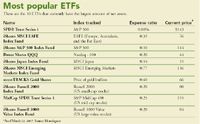Article
Should you switch to ETFs?
Your Money

Keypoints
Sometimes a new product appears and then disappears without making a ripple-remember Betamax VCRs, wristwatch TVs, or the Macarena? Other times, the new creation has some clear advantages over existing offerings, which allow it to capture a significant segment of the market.
That may be the case with exchange-traded funds-ETFs-which comprise an ever-growing force in index fund investing. An ETF is a basket of securities that trades like a stock on an exchange, usually the American Stock Exchange. That's different from a mutual fund, where you buy and sell shares back to the issuing company. ETFs track a specific market index, such as the S&P 500, and its holdings replicate those of the selected index.

ETFs have numerous advantages over index mutual funds:
Expenses: Most ETFs have lower expenses than comparable mutual funds. The average gross expense ratio for index mutual funds is 0.76 percent; the average gross ratio for ETFs is 0.61 percent, although many, such as the Vanguard Small Cap ETF, have expenses as low as 0.10 percent. A few have even lower ratios.
Taxable distributions: Mutual funds make annual taxable distributions from any capital gains they've had that year. While index funds in general have less trading and lower capital gains than do actively managed funds, even index mutual funds sometimes distribute taxable gains during each year. However, since most ETFs are fairly new, they don't have years' worth of accrued gains that a more mature index mutual fund might carry.
Opportunity to sell or buy throughout the day: Mutual funds are priced at the end of the day, after the market closes. So no matter when during the day you place your order, you'll get the closing price. In contrast, the price of an ETF-like that of a stock-varies throughout the day. So when you place your order, you'll generally get pretty close to the going price at that moment. With an ETF, you can also place a stop-loss order to automatically trigger a sale if the price drops to what you've listed, or a limit order, to buy or sell a set number of shares at a specified price or better. It's like a stock in that respect, too.
Unique choices: Remember the days before cable TV, when there were about six channels available? Now broadband and satellite offer hundreds of channels, some targeting very specific niches. That's similar to the ETF phenomenon. For example, iShares, which are ETFs put out by Barclays Global Investors, pinpoint sectors or markets such as Malaysia and other specialized choices. While there are also niche mutual funds, ETFs are even more focused.
Still, most investors choose ETFs that mirror the S&P 500. Investors currently have put over $58 billion in assets in an ETF called SPDR Trust Series 1-Standard and Poor's Depositary Receipts-which tracks the S&P 500. It's currently the largest ETF, based on net asset size.





